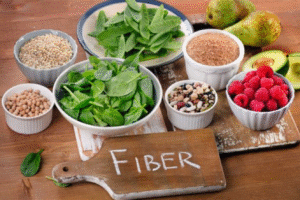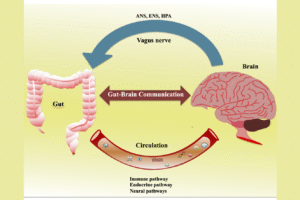
Child Nutrition and Fiber: Building Healthy Habits Early

Child Nutrition and Fiber: Building Healthy Habits Early
Introduction
As parents, we often think about giving our children enough protein for growth or calcium for strong bones. But one nutrient that is equally important, and often overlooked, is fiber.
Fiber is not just for adults; it is essential for children’s growth, development, digestion, and long-term health. From preventing constipation to supporting immunity, fiber plays a silent but powerful role in keeping children healthy. At Midas Wellness Hub, we emphasize the importance of building strong nutritional foundations early, because the habits children form in their early years often last a lifetime.
What Exactly is Fiber?
Fiber is the indigestible part of plant-based foods. Unlike carbohydrates, fats, and proteins, it doesn’t get broken down into energy. Instead, it moves through the digestive system, supporting various functions along the way.
Even though the body cannot “digest” fiber, it is essential for health. It helps regulate bowel movements, supports the growth of healthy gut bacteria, balances blood sugar, and protects against diseases. For children, these benefits are particularly important, as their growing bodies need proper nourishment and a strong digestive system to absorb other nutrients effectively.
The Two Main Types of Fiber
Children need both soluble and insoluble fiber for optimal health.
Soluble fiber dissolves in water to form a gel-like substance in the gut. It helps regulate blood sugar, improves satiety (feeling full), and supports heart health.
Insoluble fiber adds bulk to stool, prevents constipation, and promotes regular bowel movements.
Both work together to ensure smooth digestion, stable energy levels, and long-term wellness.
Why Fiber Matters in Childhood
Fiber plays a much bigger role in childhood health than many realize. Some of its most important benefits include:
1. Supports Healthy Digestion
Constipation is one of the most common complaints in children. Adequate fiber intake ensures smooth bowel movements and reduces the risk of digestive discomfort.
2. Boosts Immunity
A large part of immunity begins in the gut. Fiber feeds beneficial bacteria in the intestines, strengthening the gut microbiome and building resistance against infections.

3. Maintains Energy Balance
Children are naturally active and require steady energy. Fiber slows down the absorption of sugar, preventing energy spikes and crashes. This helps children stay more focused and energetic throughout the day.
4. Prevents Overeating and Obesity
Fiber provides a sense of fullness, which reduces unnecessary snacking. Building this habit early lowers the risk of childhood obesity, which is a growing concern worldwide.
5. Protects Long-Term Health
Early fiber intake reduces the risk of lifestyle diseases later in life, such as diabetes, high cholesterol, and heart problems. Childhood nutrition truly sets the foundation for future well-being.
How Much Fiber Do Children Need?
The recommended amount of fiber varies depending on age and gender, but on average:
Toddlers (1–3 years): ~19 grams/day
Children (4–8 years): ~25 grams/day
Older kids and teens: 26–38 grams/day
Unfortunately, most children today consume far less than the recommended amount. This is largely due to processed and refined foods, which lack natural fiber.
Signs of Low Fiber Intake in Children
Parents should watch out for the following signs that may indicate inadequate fiber:
Frequent constipation or hard stools
Stomach pain or bloating
Constant hunger and overeating
Low energy or irritability
Preference for processed foods over whole foods
While these may seem minor, if ignored, they can affect overall growth, immunity, and learning.
Fiber and the Gut-Brain Connection
One of the most fascinating areas of functional medicine is the gut-brain connection. The gut is often called the “second brain,” and fiber plays a major role in keeping it healthy.
Soluble fiber feeds good bacteria in the gut, which produce short-chain fatty acids that support brain health.
A balanced gut microbiome reduces inflammation and supports better mood regulation.
Children with healthy gut function often have better concentration, improved learning ability, and fewer mood swings.
This is why fiber is not just about digestion, it directly impacts mental well-being and cognitive development in children.
Functional Medicine and Fiber in Child Nutrition
At Midas Wellness Hub, we practice functional medicine, which means we look beyond symptoms and address the root cause. Instead of just treating constipation or tummy aches, we ask:
Is the child getting enough fiber in their daily meals?
Is their gut absorbing nutrients effectively?
Are they eating too many processed foods and missing out on whole plant-based foods?
Could stress or lifestyle habits be affecting their digestion?
By answering these questions, we guide families to create healthier eating patterns for their children. Our approach is not just about preventing problems today, but about building resilience for the future.
Common Mistakes Parents Make
Many parents want to provide the best nutrition but may unknowingly make mistakes that affect fiber intake. Some common ones include:
1. Replacing whole fruits with fruit juices – Juices lose most of their natural fiber.
2. Over-relying on processed snacks – Chips, cookies, and refined cereals may fill children up but provide little fiber.
3. Sudden increase of fiber – Introducing too much fiber too quickly can cause discomfort.
4. Ignoring hydration – Fiber needs water to work properly; without it, children may feel bloated.
Awareness of these small mistakes can make a big difference in a child’s health.
Building Healthy Habits Early
The best way to ensure children get enough fiber is by encouraging balanced eating patterns from the beginning. When children are exposed to a variety of whole foods early on, they are more likely to develop a natural preference for them later in life.
Building these habits early helps children grow into adults who:
Have stronger immunity
Maintain healthy weight
Experience fewer digestive problems
Lower their risk of chronic diseases
Final Thoughts by Dr. Shibani
Fiber may not be the nutrient most parents think about first, but it is one of the most powerful tools in ensuring children’s health and well-being. From supporting digestion and immunity to balancing energy and protecting future health, fiber deserves an important place in every child’s diet.
At Midas Wellness Hub, my goal is to help families understand the role of nutrients like fiber through the lens of functional medicine. By identifying gaps and creating simple, sustainable strategies, we empower parents to give their children the best possible start in life.
Because true wellness begins not in adulthood, but in childhood, with the small choices made every day.


